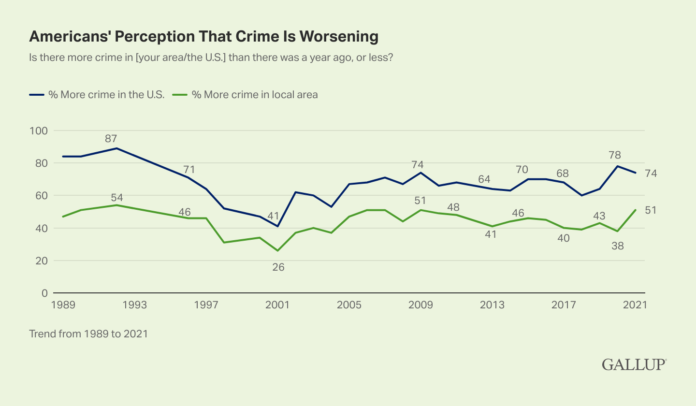Simon Li
Most Americans believe that crime is a problem that is increasing. According to a Gallup poll, 74% of Americans think that crime has increased this year and 80% of Americans worry about crime a great deal. Surely, their fears are grounded, right?
Just this year, there was a recall election done in San Francisco, California that removed progressive District Attorneys for being “soft” on crime. Politicians like Lee Zeldin (NY-1), the Republican Gubernatorial candidate for New York, have made “tough” on crime policies an integral part of their platform. If elected, Zeldin has promised to declare a “crime emergency” in New York on the very first day.
Yet despite what these politicians would want you to think, there is no surging crime wave. Not in New York City, not in Buffalo, not in New York, not in America.
This rhetoric spans back at least a decade. Seemingly, like clockwork, the issue of crime arises right around election time, rallying voters in support of “tough on crime” candidates and policies. This is because attacks on crime work – that’s why it is so pervasive.
Let’s look back at the Gallup poll from earlier. The percentage of Americans who think that crime has worsened remains steady around the high 60s and 70s range for the past three decades, with only a lull in 2001 of 41%, which Gallup explains away with the concurrent 9/11 attack. Why is this? If these perceptions of crime were true, then there would be staggering amounts of crime today. Yet the exact opposite is true – for the last thirty years, there has been a general decline in the amount of crimes committed.
In New York State, for example, total index crimes committed each year have dropped from 1,127,651 in 1991 to 556,025 in 2001 to 449,300 in 2011 to 343,357 in 2021 (2022 statistics are not finalized yet, given the year is not over). Sure, there are fluctuations year to year with crime – for example murders went up by 4.4% from 2020 to 2021, and 28% over ten years – but the overall rate has dropped. To claim that there is a crime surge, there needs to be an increase in overall crimes, not just an increase in cherry picked data. For reference, murders made up 0.25% of all index crimes in 2021, while in 2012 it was .15%. This increase is basically statistically insignificant, yet many sources that report increased crime jump immediately to an increase in murder rates. Meanwhile property crimes, which make up the vast majority of all index crimes, dropped 30% just within the last ten years and dropped 70% within the last thirty.
Why, then, do people believe that crime is surging? The answer is not simple; there is not just one cause in this type of thinking. For the rest of this article, I would like to focus on one of the leading causes: the news.
Good news doesn’t sell. Especially in America, where news is expected to make a profit, headlines sensationalize to attract attention. Good news is “bad” news, and bad news is “good” news then; “No Traffic Accidents Today” does not convey the sense of urgency or fear as “Crime Spikes in Williamsville”. Bad news captivates us. It draws in our attention and makes us demand more, presenting itself in an odd form of fascination. Like moths to a lantern, we can’t help but fly towards the light of negativity.
It is no wonder then that headlines detailing a rising crime surge have been appearing in newspapers and on TV for years now. A New York Times blog from 2007 linked a supposed crime surge to iPods of all things, asking “Is there an iCrime Wave?” Reminder: crime was actually dropping then. To this day, news outlets capitalize on “surging subway murders” in New York City to raise fears about crime – despite the fact that, again, crime is dropping.
Thus the disconnect appears: the perception of crime rising increases, while the actual crime rate drops. We are afraid of criminals that simply do not exist – while politicians and news outlets capitalize on it. All the while we ignore truly serious issues like climate change, plastic pollution, and wage theft. We ignore the truly “negative” news in favor of the sensationalized negative news. We barely talk about how rainwater is no longer safe to consume. We barely talk about the billions of dollars lost to wage theft. We barely talk about the millions who die from air pollution each year. We barely talk about the lives claimed by poverty. Instead, we talk about crime.
To reiterate one last time: there is no surging crime wave. Our attention can be, and should be directed towards other issues which truly demand it.

